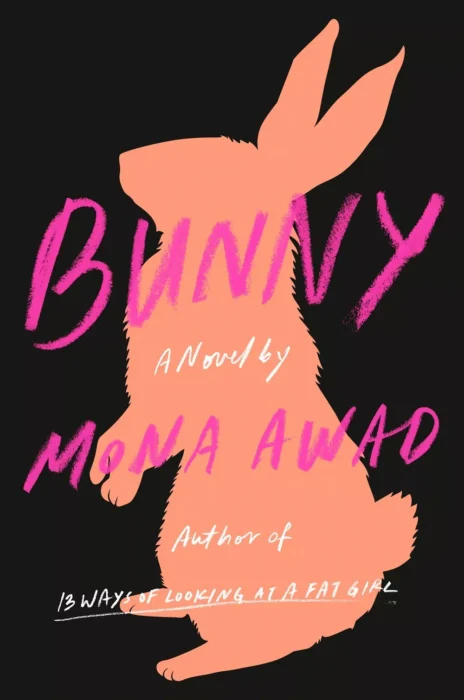For English review, please scroll down.
Bunny: פחות אקדמיה אפלה, יותר מרשמלו חרוך
מאוד מסקרנים אותי הקשרים בין סביבה אקדמית לספרות ולתהליך הכתיבה. היחסים האלה הולידו ספרים מצוינים כמו ההיסטוריה הסודית, אם היינו רשעים ו־פרקים נבחרים בפיזיקה של אסונות.
אז כשפתחתי את Bunny, שזכה לתשבחות ועטיפות נוצצות, ציפיתי לאיזו התכתבות עם הז’אנר. אולי אפילו טוויסט.
מה שקיבלתי היה משהו אחר לחלוטין: ספר שמעמיד פנים שהוא אלגוריה על נשיות, מעמדות, יצירה ואימה , אבל בפועל מסובב את הקוראת בלולאה סוריאליסטית, יומרנית וחסרת שורשים.
מרשמלו עם סכין
העלילה מתמקדת בסמנתה מקי, סטודנטית לתואר שני בכתיבה יוצרת באוניברסיטה יוקרתית בניו אינגלנד. סמנתה, בת לאם הרוסה ממשפחה הרוסה, חשה זרה, מרוחקת, כמעט שקופה , במיוחד מול חבורת סטודנטיות עשירות ומתקתקות שמכנות זו את זו "באני".
במהרה היא נשאבת לעולמן , עולם של טקסים מסתוריים, שתייה ירוקה (אבסינת? נוגה? תרמית?), וגבולות מטושטשים בין מציאות להזיה.
ה"באניז" יוצרות בנים מארנבים: טקסים מעוררי חלחלה שבהם נשחטים ארנבים, מוזרם רגש, ובסופו של דבר נוצרת דמות. זה נשמע מטורלל , וזה אכן כך. אבל זו גם מטאפורה לבריאה ספרותית בקולקטיביות רעילה: הכתיבה כטקס ביזארי, סדנאות MFA כהקרבה עצמית לטובת סיפור שהוא אולי מושלם טכנית , אבל חסר נשמה.
איפה הסיפור, איפה האמירה?
ככל שהספר מתקדם, גם סמנתה עצמה מתפרקת. גבולות המציאות נמרחים. הקול המספר נעשה בלתי אמין, זרם התודעה מבלבל, והקוראת לא יודעת מה אמת ומה השלכה נפשית.
אבל כאן טמונה הבעיה: לא כל הזיה היא עומק.
הספר מייצר תחושת ניכור , אך לא מטפל בה. הוא זורק סמלים, אך לא טווה מהם אמירה. הוא בונה סצנות סוריאליסטיות, אך נמנע מלעמת אותן עם אמת פסיכולוגית או מוסרית כלשהי. במקום להיות יצירה אפלה עם לב פועם, הוא הופך לאסתטיקה ריקה של עצב.
לא ביקורת, לא פרודיה , רק רעש
ה"באניז" עצמן אינן דמויות , הן ייצוגים. הן בובות מהונדסות. וככל ש-Bunny מתקדם, גם סמנתה עצמה הופכת לדמות ריקה: לא סובייקט, אלא כלי להעברת הזיה.
אם הספר מנסה לומר משהו על נערות מרקע קשה שלא שורדות באליטה , הוא עושה זאת דרך ייצוג מעוות וחסר חמלה. אם הוא מנסה לגעת בפולחן הכתיבה, הוא רק מתחזה לפרודיה, בלי באמת להבין את עומק הכאב שכרוך בכתיבה אותנטית.
התוצאה: לא עומק, לא פרודיה, לא אלגוריה , רק בליל של סצנות ביזאריות, דימויים שנועדו לזעזע, ודמויות שהן חלולות לא רק בעלילה , אלא גם ברגש.
סיום אישי, ואכזבה מרה
כמי שנמשכת ליצירות שחוקרות את המתח בין יצירה, זהות ומוסדות כוח , נכנסתי ל־Bunny עם ציפייה אמיתית למצוא בו עומק, פרובוקציה אמיצה או לפחות רמז לחקירה של כאב נשי דרך פריזמה אקדמית. אבל ככל שהתקדמתי, הרגשתי פחות כמו קוראת ויותר כמו מישהי שכלואים אותה בתוך פרפורמנס שכולו הצגה עצמית , בלי חמלה, בלי אמת, ובלי כוונה להישאר איתך גם אחרי העמוד האחרון.
"Bunny" אינו Dark Academia , הוא אקדמיה ורודה: טקסים פסבדו-אינטלקטואליים, שטחיות עטופה בנצנצים, ורגש ריק שמתיימר להיות עומק.
הוא מהדהד את הז'אנר רק בקווים החיצוניים: אוניברסיטה, סדנת כתיבה, דמויות קודרות. אבל אין בו את המוסר המתפורר של The Secret History, את הכאב החי של If We Were Villains, או את התבונה הלשונית של מרישה פסל. יש בו רק תחושת ריק שמתחזה לחשיבה עמוקה. וזו לא רק החמצה , זו אכזבה אמיתית.
Bunny/ Mona Awad
Kindle Edition, 2019, 274 Pp
דירוג SIVI –
איכות אודיו –

Bunny #1
Bunny: Less Dark Academia, More Burnt Marshmallow
I’m deeply intrigued by the relationship between academia, literature, and the act of writing. This dynamic has given rise to some excellent novels — The Secret History, If We Were Villains, and Special Topics in Calamity Physics, to name a few.
So when I opened Bunny,praised by critics and wrapped in shiny covers,I expected some engagement with the genre, maybe even a fresh twist.
I got something entirely different: a novel pretending to be an allegory about femininity, class, creativity, and horror , but in reality, it spins the reader into a surreal, pretentious loop with no roots or direction.
Marshmallow with a Knife
The plot follows Samantha Mackey, a grad student in a prestigious MFA program in New England. Samantha, the daughter of a broken mother from a broken home, feels alienated and invisible, especially next to a clique of wealthy, saccharine classmates who call each other “Bunny.”
Soon enough, she’s pulled into their bizarre world, a world of mysterious rituals, green drinks (Absinthe? melancholy? performance?), and blurred lines between fantasy and reality.
The Bunnies create boys out of rabbits: grotesque rituals where rabbits are slaughtered, emotions are channeled, and ultimately a human-like figure is “born.”
It sounds unhinged , and it is. But it’s also a metaphor for literary creation in a toxic collective: writing as a bizarre sacrificial ceremony, MFA workshops as soulless performance for technical perfection.
Where’s the Story? Where’s the Point?
As the novel progresses, Samantha’s disintegration increases. Reality loses shape, and her narrative voice becomes increasingly unreliable. The stream-of-consciousness style creates disorientation but not insight.
And here lies the issue: not every hallucination is deep.
The novel evokes a sense of alienation but doesn’t explore it. It throws around symbols but refuses to develop them into meaning. It builds surreal scenes but avoids confronting any emotional or moral truth. Instead of a dark, beating heart, we’re left with the aesthetic of sadness,hollow and polished.
Not Satire, Not Critique – Just Noise
The Bunnies themselves aren’t characters; they’re constructs, engineered dolls.
As Bunny trudges on, Samantha becomes empty: not a subject, just a vessel for metaphor.
If the novel tries to say something about working-class women who fail to survive elite institutions, it does so through a distorted, compassionless lens. If it’s meant to satirize the cult of writing, it merely poses as a satire, without truly understanding the pain that comes with authentic creative work.
The result? Not depth, parody, allegory, just a swirl of grotesque scenes, cheap shock-value imagery, and hollow characters in plot and emotion.
Personal Ending , and Bitter Disappointment
As someone drawn to stories that explore the tension between creativity, identity, and institutional power, I came to Bunny genuinely hoping for insight, provocation, or at least a nuanced examination of feminine pain through an academic lens.
But the deeper I got, the less I felt like a reader, and more like someone trapped in an endless performance of self-reference, devoid of empathy, honesty, or any desire to linger in the reader’s mind after the final page.
Bunny isn’t Dark Academia, it’s Pink Academia: pseudo-intellectual rituals, glitter-wrapped shallowness, and hollow sentiment dressed up as literary depth.
It mimics the genre only in aesthetic: campus setting, writing workshops, and moody characters. But it lacks the moral decay of The Secret History, the emotional immediacy of If We Were Villains, or the linguistic brilliance of Marisha Pessl.
All it offers is a haunting void masquerading as thought. And that’s not just a missed opportunity, it’s a genuine disappointment.
לגלות עוד מהאתר Sivi's Books
Subscribe to get the latest posts sent to your email.

